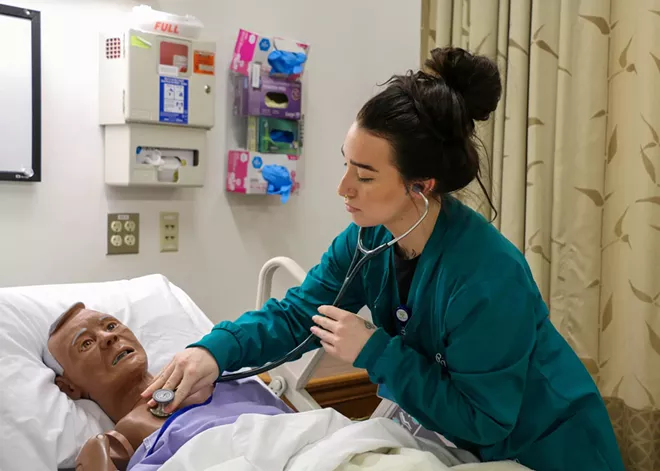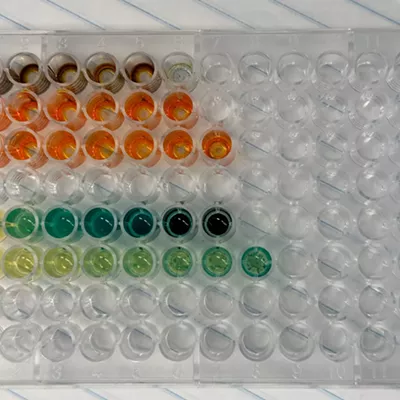
Beyond the innovative research happening at our local universities, it's been a busy year for higher education in the Inland Northwest. Here are some of the big changes.
TAKING THE LEAD
After years of continuous leadership, both Washington State University and Gonzaga University have or will have new presidents.
Last year, then-WSU President Kirk Schulz announced he would retire by June 2025. However, after the Board of Regents selected a new president in February, it announced Schulz would step down sooner.
On April 1, Elizabeth Cantwell began her time as WSU's 12th president, and Schulz stepped into a one-year senior adviser position. The former Utah State University president is the first woman to stand at the helm of Washington's second-largest university.
Still within her first 100 days, Cantwell is working to get acquainted with the school by "building strong relationships and gaining a comprehensive understanding of institutional strengths, challenges and opportunities."
Meanwhile, Katia Passerini, currently provost and senior executive vice president of New Jersey's Seton Hall University, will become Gonzaga's new president on July 15. She will succeed Thayne McCulloh, who served for 16 years as president of the university where he's worked since 1990.
Passerini will be the first woman to lead the Catholic Jesuit school in its 138-year history.
"Her current role ... together with her previous academic and administrative appointments, have prepared her well for this next stage in a stellar higher education career. The Board of Trustees voted unanimously in favor of electing Dr. Passerini," Board Chair Michael Reilly stated after Passerini's hire.
PRACTICAL REVAMP
Starting in January, Spokane Community College welcomed its first cohort of practical nursing students in decades. SCC's previous practical nursing program evolved into the more rigorous registered nursing program, but in recent years there's been a push to get more of these practical nurses educated and hired.
"Typically, your registered nurse is going to be hired into departments, like the emergency department, the ICUs, because their scope is a little larger, and they have a better background and skillset to take care of those critical patients," explains Brittany Heidenreich, the practical nursing program's lead instructor. "Whereas practical nursing's scope is a little bit more narrow. Lots of practical nurses are being hired in long-term care facilities, skilled nursing facilities and hospice clinics."
Some hospitals, such as MultiCare Deaconess, hire practical nurses in inpatient units, she says.
So far, eight students have enrolled in the one-year certificate program, and another eight will start in the summer. The program, which was funded through a nearly $400,000 Rural Health Grant from the State Board of Community and Technical Colleges, is the only of its kind at colleges in Eastern Washington, Heidenreich says.
"Creating that extra avenue for students to get into the health care community, to maybe try out nursing, to see if it's a good fit for them before they go on to registered nursing, is really important," she says. "Our skilled nursing facilities are really short staffed, and filling those positions with practical nurses is a good step forward."
ON THE MEND
At this time last year, North Idaho College leaders were still fighting to save the college's accreditation — the certification that affirms a college or university meets quality standards — and bring it back into compliance with those standards. In March 2024, the Northwest Commission on Colleges and Universities (NIC's accrediting body) informed the college that it had made significant progress on many of the commission's recommendations, but that many of the issues pertaining to NIC's Board of Trustees remained out of compliance.In August, the college sent a report to the commission affirming that its board had made efforts to only have a single college president, shore up sour relations with President Nick Swayne and his administration, and adhere to a more rigorous set of policies surrounding "appropriate roles and responsibilities, expectations, professional conduct and ethics, and grievance procedures." In the report, NIC argued its progress warranted a reduction in sanctions, if not a return to good standing.
After NIC sent that August letter, three seats on the Board of Trustees were up for election. The positions were held by Todd Banducci, Mike Waggoner and Greg McKenzie, the majority responsible for many of the college's issues, including paying for two presidents at the same time. In 2023, the trio voted to fire Swayne without cause and hired a replacement president on an 18-month contract even though a court ordered Swayne's reinstatement. In November, three newcomers, Eve Knudtsen, Mary Havercroft and Rick Durbin, were elected to those seats as Waggoner and Banducci did not seek reelection, and McKenzie lost his bid for reelection.
In February, the commission decided that NIC had made enough progress to be moved from a "sanction of show cause" to probation, with a one-year deadline to fix the remaining issues, such as addressing multiple votes of no confidence from faculty, staff and students.
Months after the trio were elected to the board, and weeks after the accrediting commission's decision, every vote of no confidence was rescinded.
"In my humble opinion, this board did more work in 45 minutes than the previous board had done in 2 1/2 years," head of the faculty assembly Kathleen Miller Green told Idaho Education News in April. ♦

























